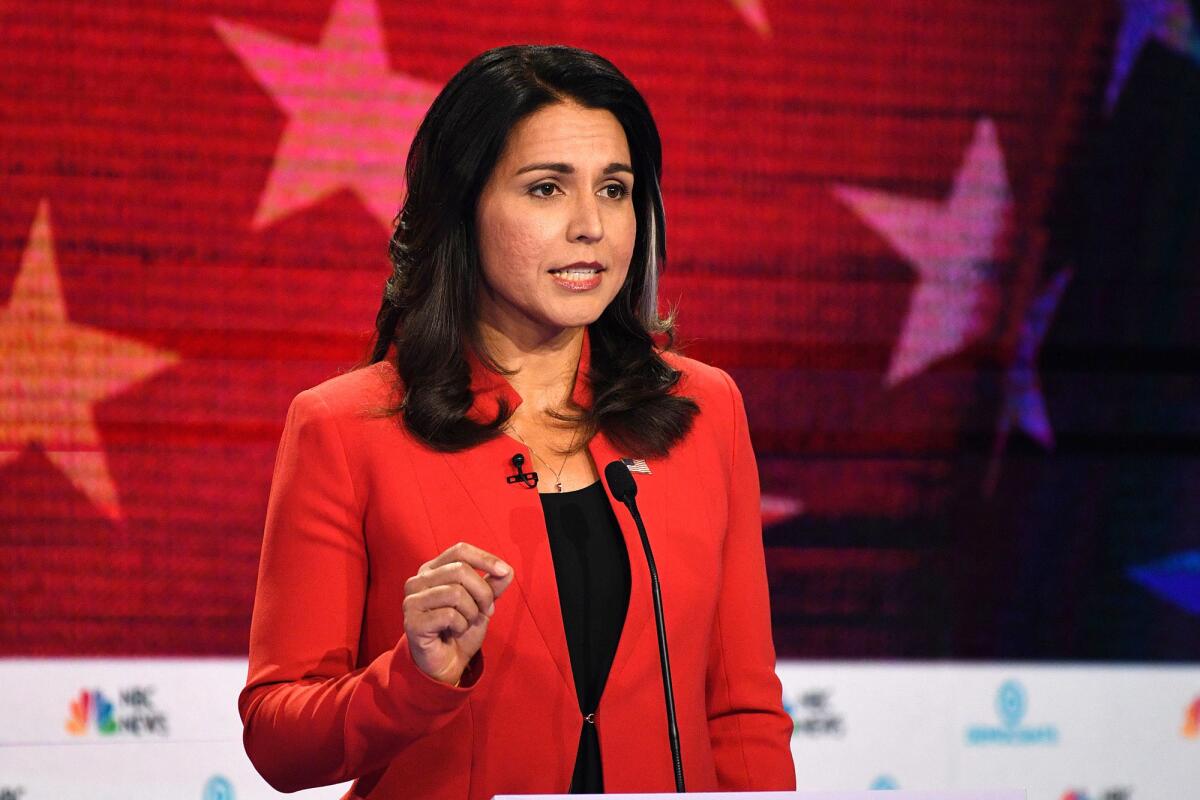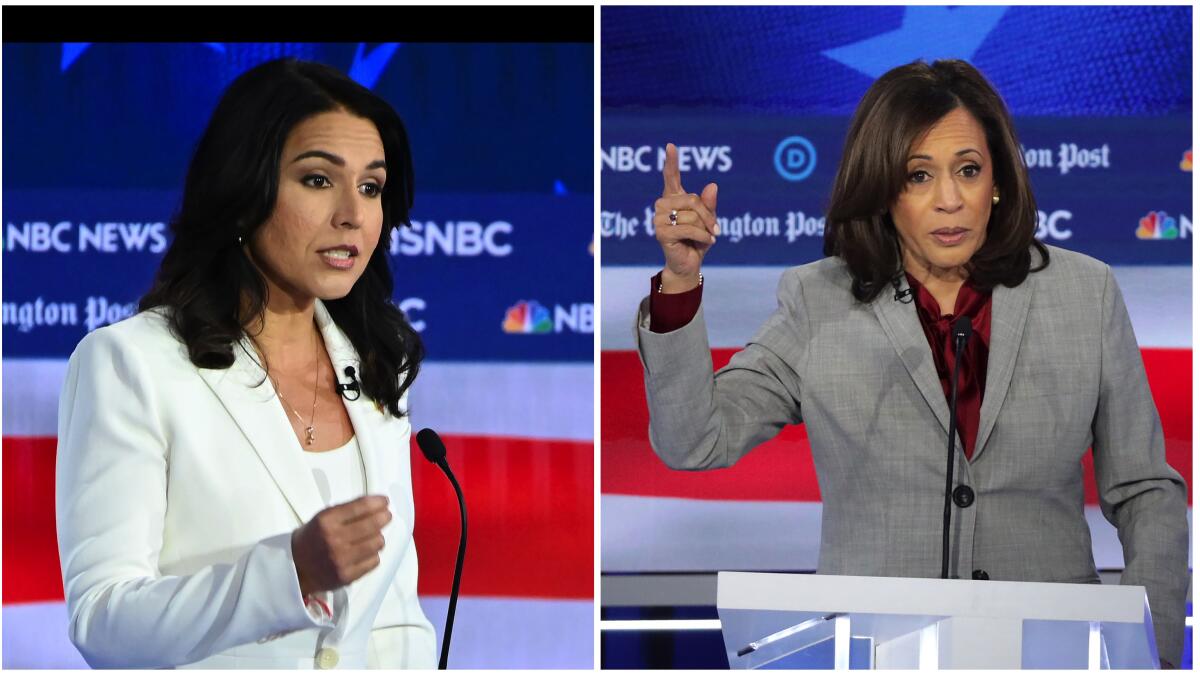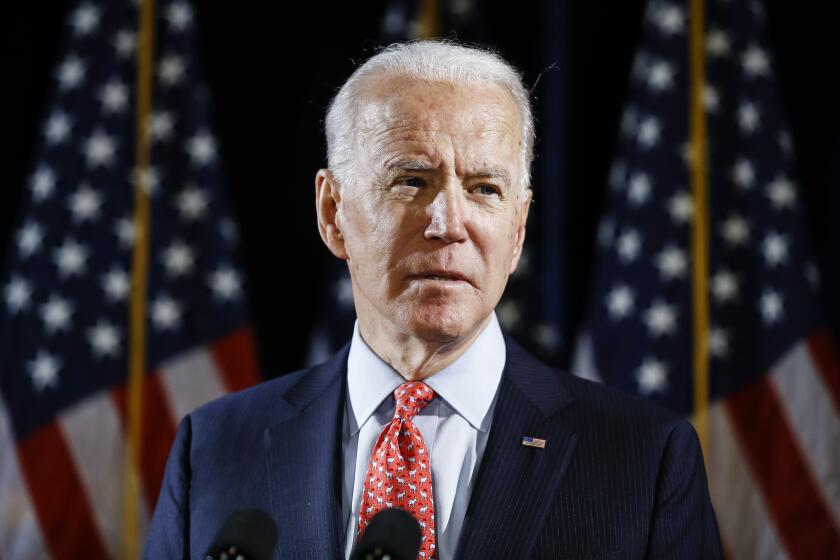Tulsi Gabbard drops out of presidential race and endorses Joe Biden

- Share via
Rep. Tulsi Gabbard of Hawaii officially abandoned her campaign for the Democratic presidential nomination on Thursday and offered support to former Vice President Joe Biden, saying it’s clear that primary voters have chosen him to take on President Trump.
“Although I may not agree with the vice president on every issue, I know he has a good heart, and he’s motivated by his love for our country and the American people,” she said in a video to supporters she posted on Twitter. She said Biden would “help heal the divisiveness that has been tearing our country apart.”
Gabbard also praised Sen. Bernie Sanders, who has fallen behind Biden in the delegate count and has little chance to catch up. In 2016, Gabbard backed Sanders against Hillary Clinton, leaving a post with the Democratic National Committee to endorse the Vermont senator.
Her endorsement of Biden quiets speculation about whether she would launch a bid as a third-party candidate, which she long said she would not do.
Gabbard’s exit from the race comes months after she’d effectively stopped being a genuine contender.
Even as a large group of more viable candidates dropped out of the race — Massachusetts Sen. Elizabeth Warren and former Mayor Pete Buttigieg of South Bend, Ind., among them — Gabbard had soldiered on with occasional Fox News appearances despite her failure to qualify for recent Democratic debates or win support when voters cast primary ballots.
On Super Tuesday, she captured her only delegates, two from the territory of American Samoa, where she was born, coming in second place to former New York Mayor Michael R. Bloomberg, who dropped out of the race the next day. In Florida and Arizona, which voted Tuesday, she got 0.5% of the votes and finished in seventh place, behind four candidates who’d already dropped out.
In more than a year of campaigning, the four-term congresswoman failed to break out of the bottom tier of a once-crowded field, but managed to stir up controversy along the way. Her clashes with Clinton and California Sen. Kamala Harris generated more attention than Gabbard’s policy agenda.
When Clinton referred to Gabbard as “the favorite of the Russians” in October, Gabbard called the 2016 presidential nominee and former secretary of State “the queen of warmongers, embodiment of corruption, and personification of the rot that has sickened the Democratic Party.”
Three months later, Gabbard filed a defamation suit against Clinton, saying she “reserves a special hatred and animosity for Tulsi” because she backed Sanders in 2016. A Clinton spokesman called the suit ridiculous.
Gabbard’s attacks on Harris, also a former 2020 Democratic presidential candidate, were among the nastiest confrontations of the primary season. In a July debate, Gabbard took aim at Harris’ record as California attorney general and San Francisco district attorney; Gabbard’s accusations were misleading, fact checkers found.
In a November debate, Harris, who dismissed the criticisms, lashed out at Gabbard, saying the congresswoman had “spent four years full time on Fox News criticizing President Obama.”
“That’s ridiculous, Sen. Harris,” Gabbard responded, accusing her rival of trafficking “in lies and smears and innuendos.”
In October, Gabbard threatened to boycott a debate in Ohio, accusing the “corporate media” and Democratic National Committee of rigging the event — only to participate after all. She has not been on a debate stage since November.
An Iraq war veteran who enlisted in the Hawaii Army National Guard in 2003, Gabbard vowed to halt what she branded the “Bush-Clinton-Trump foreign policy doctrine of regime-change wars.”
“I left my seat in the state Legislature in Hawaii, volunteered to deploy to Iraq, where I served in the medical unit where every single day I saw the terribly high human cost of war,” she said in the November debate.
Gabbard, 38, was elected to the Hawaii Legislature in 2002, when she was 21. After her return from Iraq, she won a seat on the Honolulu City Council in 2010, then ran for Congress two years later. Born in American Samoa, she moved with her family to Hawaii when she was a toddler. She is the first Hindu elected to Congress.

Just days after she announced her run for president in January 2019, Gabbard posted a video apologizing for her past opposition to gay rights, saying her views had changed. Early in her career, Gabbard worked for an anti-gay group led by her father, opposed Hawaii’s civil unions for same-sex couples and said Democrats should not represent the views of “a small number of homosexual extremists.”
“In my past, I said and believed things that were wrong, and worse, they were hurtful to people in the LGBTQ community and to their loved ones,” she said in the video.
Gabbard found herself repeatedly defending her 2017 meeting with Syrian President Bashar Assad, who has been accused of war crimes including chemical weapons attacks on his own people in the country’s long civil war.
“I will never apologize to anyone for doing all that I can to prevent more of my brothers and sisters in uniform from being sent into harm’s way to fight in these wasteful, counterproductive regime-change wars,” she told CNN in August. “Even if it means meeting with a brutal dictator, focus on that objective, keeping the American people safe.”
Gabbard is not seeking reelection to her House seat.
The field is down to Joe Biden now that Bernie Sanders ended his presidential campaign. Here is the Democrat heading for a battle with President Trump.
More to Read
Get the L.A. Times Politics newsletter
Deeply reported insights into legislation, politics and policy from Sacramento, Washington and beyond. In your inbox three times per week.
You may occasionally receive promotional content from the Los Angeles Times.












